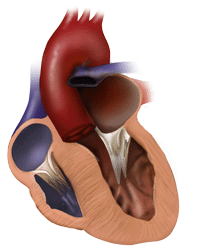Cardiomyopathy is a serious disease. However, like most diseases, dilated cardiomyopathy happens with a range of severity and outcome.
Depending on the cause and the degree of irreversible damage to the heart muscle, about 1/3 of patients have persistent poor heart function, 1/3 improve but are left with some heart dysfunction, and 1/3 recover completely.
It is difficult to predict which category a patient will be in, therefore frequent cardiology follow-ups are extremely important. Patients who do have irreversible damage and persistent poor function may go on to need a heart transplant.
The exact number of patients with cardiomyopathy is unknown, as some patients will have no symptoms. The chance of premature death is estimated to be less than 1 %.
Risk factors for sudden death include episodes of fainting, family history of sudden death, marked heart thickening on echocardiogram and fast heart rhythms seen on monitoring.
Less than 5 % of patients will have later complications like enlargement of the left ventricle and decreased pumping function.
Restrictive cardiomyopathy accounts for only 5 % of patients with the disease. Only 45 to 50 % of patients with this type of cardiomyopathy are estimated to survive two years after the diagnosis. Some patients may also require heart or heart lung transplantation.
Of course each patient is different and only a trained physician can give you the correct data in your case.
